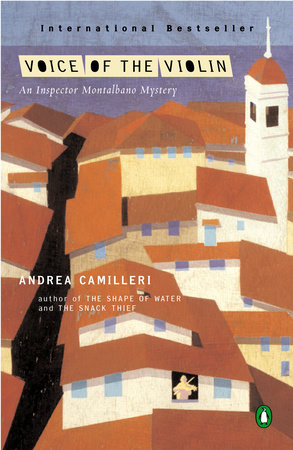READERS GUIDE
Questions and Topics for Discussion
INTRODUCTION
Police Inspector Salvo Montalbano could write a book about the subtleties of Sicilian cuisine, but he is admittedly ignorant when it comes to music. Nevertheless, in Voice of the Violin, the fourth Montalbano mystery, the inspector must learn to listen to the world in unfamiliar ways in order to make sense of a baffling array of clues. A beautiful woman is found smothered and naked in the bed of her unfinished home, and a search of the house turns up no articles of clothing other than a pink bathrobe. Soon afterward, a prime suspect in the case is gunned down by a police squad in less than transparent circumstances. The dead woman’s husband, who claims to have loved her “like a daughter,” views her murder with a strange emotional detachment. Meanwhile, above all the confusion, as if on a level of existence more celestially beautiful than ours, a masterful but reclusive violinist plays free morning concerts for his paraplegic neighbor.
Voice of the Violin is a classic whodunit, taking the reader on a labyrinthine path that leads from the discovery of a murder victim to the climactic unmasking of the killer. In the hands of a master storyteller like Andera Camilleri, however, the classic is never the conventional. As Montalbano implacably tracks down the murderer, he also continues to deal with a thorny romantic life and the frustrations of working within the criminal justice system, all the while indulging his insatiable appetite for Sicilian delicacies.
ABOUT ANDREA CAMILLERIAndrea Camilleri’s Montalbano mystery series, bestsellers in Italy and Germany, has been adapted for Italian television and translated into German, French, Spanish, Portuguese, Greek, Japanese, Dutch, and Swedish. He lives in Rome.
DISCUSSION QUESTIONSAs in all of the Montalbano mysteries, Andrea Camilleri paints a detailed portrait of small-town Sicilian life, which he portrays as violent and corrupt, yet redeemed by a sensuous awareness of beauty. What are the sources of beauty inVoice of the Violin, and do they compensate for the harsher aspects of the life Camilleri describes?
In chapter nine, Mimì tells Montalbano that he is not cut out to be a father, either biological or adoptive. Is his assessment of his boss accurate? Why would the inspector make or not make a good father?
In Voice of the Violin, Montalbano continues his love affair with Livia, a liaison that both find intensely frustrating but without which neither is prepared to live. What, in your view, makes the two so dependent on each other and yet so mutually infuriating?
The hapless Catarella, whose endless blunders generate much of the comedy in the Montalbano series, seems finally to have found his niche in computer technology. How is Camilleri using Catarella to express an opinion about the computer age?
Adelina, Montalbano’s housekeeper, routinely leaves exquisitely prepared dishes in her employer’s refrigerator, but the two almost never see each other face to face. When Montalbano dines out, he very often eats alone. Why do you think Camilleri has Montalbano gratify his love for food without more human contact?
The Montalbano novels take few specific political positions. However, the general political flavor of these is somewhat left of center. Nicolò Zito, arguably Montalbano’s best friend and the most astute television news commentator in the province, is a communist. When a labor dispute breaks out, Montalbano reflexively sides with the workers. How do you respond to the political undercurrents in Camilleri’s work?
Although Montalbano is inwardly hurt when the boy he has hoped to adopt rejects him, he makes no attempt to press for the child’s custody. In your view, should he have put up more of a fight? Why or why not?
Montalbano admires Anna Tropeano for her “astonishing, wholly feminine capacity for deep understanding, for penetrating one’s feelings, for being at once mother and lover, daughter and wife.” How does Montalbano’s concept of femininity influence his ability to understand and have relationships with women?
Near the end of the novel, Montalbano looks back on the entire Licalzi case as “one mistake after another.” Why do you think this novel, and crime fiction in general, so often revolves around mistakes and accidents of one kind or another?

